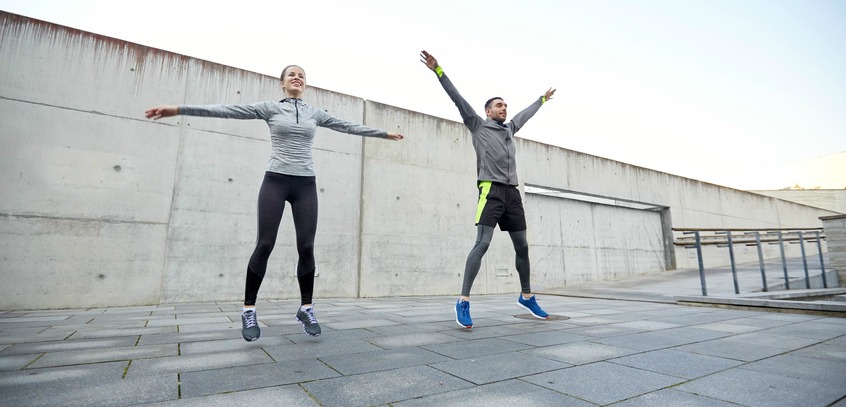10 bonnes raisons de faire du sport qui n’ont rien à voir avec le physique
Et vous, quelles sont vos bonnes raisons de faire du sport ? Que le premier pratiquant de fitness qui n'a jamais entendu "Mais tu n'as pas besoin de faire du sport, tu es déjà suffisamment mince/musclé" lève la main ! Cela nous est tous arrivé un jour ou un autre de faire face à l'incompréhension de ceux pour qui le sport est un mal nécessaire pour perdre du poids et qui abandonnent une fois leurs petits kilos envolés (pour les reprendre aussitôt - mais ça c'est une autre histoire). Contrairement à ce que pensent beaucoup, s'adonner au fitness n'est pas juste une histoire de physique ou d'un quelconque narcissisme car les bénéfices de l'activité sportive dépassent largement les questions de minceur et de muscle ! Voici 10 bonnes raisons de s'entraîner qui n'ont rien à voir avec la taille de notre jean !
1- Le sport est bon pour le moral
Lorsque l'on s'entraîne, notre cerveau libère des endorphines autrement appelées "hormones du bonheur". Celles-ci nous permettent de voir vie sous un angle autrement plus positif et d'éviter les petits coups de blues. Une étude américaine a ainsi montré qu'il suffit de 20 minutes d'effort pour booster notre humeur pour les 12 heures qui suivent ! Pour un moral au top, il est recommandé de pratiquer au moins 30 minutes d'activités physique 3 à 5 fois par semaine.
2- Le sport est un détressant naturel
Le sport permet également d'agir directement contre le stress en freinant de manière assez radicale les effets néfastes de l'adrénaline et du cortisol, deux hormones libérées en situation d'anxiété. En outre, se couper de ses préoccupations quotidiennes en allant se dépenser à la salle de sport nous permet de bien nous vider la tête et d'évacuer ce qui nous stresse.
3- Le sport rend plus intelligent
Fini le mythe du sportif sans cervelle ! Des études montrent qu'au contraire, pratiquer régulièrement un sport permet d'accroître considérablement nos facultés cognitives : on a de meilleures facultés de mémorisation, de réflexion et de concentration et on devient même plus créatif. On dira ça à notre boss quand on a dix minutes de retard parce qu'on est allé s'entraîner avant d'aller bosser !
4- Le sport rend plus sociable
Même si l'on est adepte de la musculation en solo, fréquenter régulièrement une salle de sport nous permet de rencontrer plein de nouvelles têtes que l'on aurait jamais croisées autrement. C'est plus facile d'aller vers les autres quand on partage une passion commune (et en contre partie, c'est autrement plus motivant d'aller s'entraîner quand on sait que l'on va retrouver des personnes sympas...).
5- Le sport améliore notre sommeil
À condition de ne pas fournir un effort intense juste avant d'aller au lit, faire du sport nous permet d'améliorer sensiblement la durée et la qualité de notre sommeil car il crée une bonne fatigue. Dire enfin adieu aux insomnies, ce n'est pas rien quand on sait que près de la moitié des français se plaint de troubles du sommeil.
6- Le sport nous donne confiance en nous
Lorsque que l'on réussit à accomplir les défis que l'on s'est lancé - ne serait-ce que parvenir à aller à la salle trois fois par semaine, et que l'on voit nos performances s'améliorer de jour en jour nous permet de constater tout ce dont nous sommes capables. Effet coup de boost pour l'estime de soi garanti !
7- Le sport nous permet d'être moins souvent malade
Selon l'American Council on Exercice, faire du sport régulièrement permet de renforcer son système immunitaire et d'être moins susceptible de choper le premier virus qui se présente, sinon d'en réduire les effets ! Attention toutefois de ne pas trop en faire car le sur-entraînement a l'effet inverse !
8- Et il nous aide à mieux vieillir
Non seulement le sport permet de lutter contre l'apparition des rides mais il est également un allié de poids pour vieillir en pleine forme en nous aidant à éviter de nombreux problèmes liés à l'âge, qu'il s'agisse de troubles cardio-vasculaires ou d'arthrose...
9- Le sport nous donne de bonnes raisons de faire du shopping
Si on est du genre à culpabiliser lorsque l'on fait shopping, la pratique d'un sport permet de se laisser aller à quelques craquages sans culpabilité ! Eh oui, c'est important d'être bien équipé et d'avoir de quoi se changer, non ?
10- Le sport améliore notre vie sexuelle
Last but not least ! Non seulement le sport nous détend et nous permet de nous sentir plus attractif mais il augmente également l'endurance et la maîtrise de soi... Et cela n'est pas uniquement utile à la salle de sport ^^ Maintenant, vous saurez quoi répondre à ceux qui voient d'un mauvais oeil votre fréquentation assidue de la salle de sport!
 Offre spéciale : Les 4 premières semaines à 19€
Offre spéciale : Les 4 premières semaines à 19€



